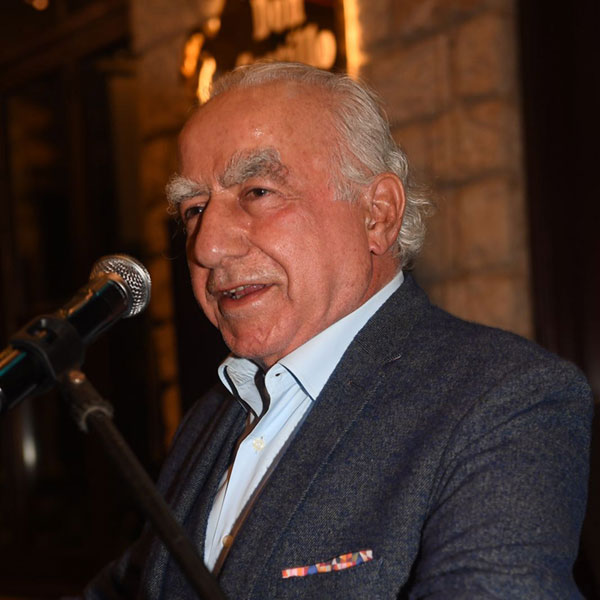Tahseen Salah Khayat is a Lebanese businessman and the owner of Tahseen Khayat Group, which functions in the fields of publishing, printing, and distribution. He is also the Chairman of the Board of Directors of the Al-Jadeed TV channel. Khayat is known for his Arab nationalist orientation and is characterized by his bravery and courage in supporting the causes of the Lebanese people and uncovering hidden files of corruption. He has always consistently supported the right of nations to self-determination.
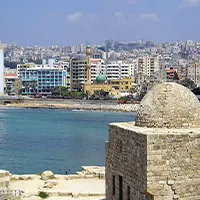
A Brief Overview of His Life: Upbringing in Sidon
Tahseen Khayat was born in the neighborhood of Al-Qanaya in South Sidon on October 24, 1942. His father, Judge Salah Khayat, was renowned for his fairness and courage in confronting the challenges of the French Mandate era. His mother, Munira Fawaz, was a remarkable woman who utilized her modest resources to invest in the education of her children, thus shaping their future.
As a result of her investments, Tahseen Khayat, the third son of a family consisting of Bashar, Hassan Adnan, Bashra, and Malouki, improved.
The family’s origins trace back to Mr. Ahmed Al-Zain, who managed to escape the hangman’s noose during the time of Jamal Pasha the butcher, and fled to Syria where he began working manually. He gained fame from his profession as a tailor and became known as “Ahmed Khayat”. His nickname stuck with him after he returned with his family from Syria because he was still wanted on the list of those sentenced to death by Turkish customary courts. He returned to continue his resistance against the Turks in Lebanon.
Ahmed Khayat had a son named Tahseen the grandfather, who had a close relationship with the Mufti Bahaa Al-Din Al-Zain and married the Mufti’s sister.
Tahseen grew up in a resistant family since his great-grandfather’s time and was influenced from an early age by the atmosphere of resistance and Arabism that dominated his thoughts, principles, and struggle.
He studied at the American School of Arts in Sidon, where cultural and sectarian diversity prevailed, and he frequented the Jihad Club where the Arab nationalists organized lectures and some activities.
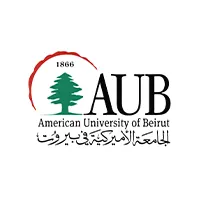
University and his political activities
Tahseen Khayat moved to Beirut in the sixties to join the International College in Beirut, IC, and then the American University of Beirut, where he completed the required courses to pursue a medical degree at the medical school. However, his occupation with political activities and his organization of student movements within the university changed his path as a doctor. Consequently, he chose to specialize in the field of biology.
During his master’s studies, Khayat worked as a teacher at the same university for one year. During which, he continued to organize political events to defend freedoms and Arab and nationalist positions that he had always advocated and fought for.
However, he soon resigned from his teaching duties at the university after getting to know Paul Khayat, the owner of Khayat’s Library and an agent for Britannica encyclopedias. He started working with him as a sales representative for Britannica encyclopedias, which were considered rare currency in the world of books, and their sales generate much higher profits than a teacher’s salary. Since then, Tuhseen Khayat entered the world of books open to knowledge and profit at the same time.

Tahseen Khayat Professional Life: Printing and Publishing in Arab Countries
Tahseen Salah Khayat began his professional career as a sales representative for the Britannica Encyclopedia, which was represented in the region by Paul Khayat. He excelled in his role and completed his university studies, obtaining a Master’s degree in Biology.
Khayat achieved remarkable sales figures for encyclopedias and books, leading Paul Khayat to send him to Kuwait to enhance and expand the sales department there, as well as manage the Khayat library in Kuwait.
In 1968, Paul Khayat declared bankruptcy for his library in Lebanon. Tahseen Khayat returned to Beirut to assist his employer in this difficult time. Upon Paul’s request, Tahseen traveled back to Kuwait with the hope of securing financial support for the company from Kuwait, but unfortunately, the company faced the same fate of bankruptcy. At that point, Paul suggested to Tahseen that he should take the books from the library and the Britannica Encyclopedia and go to Kuwait to sell them and benefit from them, as he was unable to pay him his dues. Tahseen, who was 24 years old at the time, agreed to the proposal and moved to Kuwait.
When in Kuwait
Khayat entered into a partnership with some businessmen to sell the books and he founded the “Al-Matbu’at for Distribution and Publishing” company, his contribution primarily focused on the books and Britannica encyclopedias he acquired from Paul Khayat. However, this partnership did not last long as Tahseen’s ambition drove him to seek a partnership that would enhance his position in the business world. He ended his collaboration with his initial partners by mutual agreement and joined forces with Abdulaziz Malla Hussein Abdullah Al-Turki.
Abdulaziz Malla Hussein Abdullah Al-Turki later withdrew from the company after being appointed as Minister of Cabinet Affairs, making way for his brother-in-law, Mohammed Abdul Salam Shuaib. However, their partnership also proved short-lived as the new partner did not have an interest in the publishing and books industry. As a result, Khayat obtained a new license for the company under the name “Union Gulf Establishment” and became the sole commissioner for this company, which has continued to thrive until the present day.
Abu Dhabi
Khayat headed to Abu Dhabi where he founded a book-selling company that carries the same name as his former company in Kuwait, “Al-Matbu’at for Distribution and Publishing”. In 1969, he opened the first library in Abu Dhabi that was turned into a cultural and educational landmark, being the first and oldest library in the Emirate of Abu Dhabi. This library still exists to this day, serving as a hub for intellectual and educational pursuits.
Khayat managed to accomplish remarkable success in the world of books, printing, and publishing. He became famous in the world of business and build strong relations with Major Arab and international publishing houses and influential figures in the Arab world. Furthermore, Tahseen Khayat established commercial companies for book sales in Lebanon, Qatar, Oman, Saudi Arabia, London, and Paris. He also secured contracts with several ministries of education, universities, and schools in the Arab world and Britain.
He formed strong friendships within the world of journalism, including notable figures such as Mohamed Hassanein Heikal, Salim Al-Lawzi, and Ghassan Tueni. Khayat served as a publisher for Heikal’s books, the most prominent of which was “Khareef Al-Ghadab” (“Autumn of Anger”). The book’s sales reached levels comparable to those of the Quran. However, this book became a reason for the late President Anwar Sadat’s decision to imprison Heikal because he described Gamal Abdel Nasser as one of the last giants in his work. As a consequence, Khayat was prohibited from entering Egypt throughout Sadat’s presidency.

Printing and Publishing in the UK
Khayat moved to England after that where he owned the English publishing house Geoprojects, specializing in maps and atlases. The company expanded its operations to include curriculum development, educational materials preparation, publishing textbooks for various subjects, educational consultations, training courses, curriculum evaluations, educational research, and dictionary publications.
In 1979, Khayat established a joint venture company with Oxford University Press, which was the first of its kind in the prestigious history of the University of Oxford. The company was named “ELTA-OUP” (English Language Teaching for the Arab World – Oxford University Press). This partnership continued until 1999. Afterward, Khayat founded the British company “Garnet,” which still exists in the UK to this day.

Printing and Publishing in France
Tahseen Khayat established the company “Edifra” in France, focusing on publishing the French language for non-native speakers in collaboration with Hachette Publishing House. They published books that emphasized cultural, intellectual, and literary aspects of the French language. Additionally, Khayat established a library at the “Institut du Monde Arabe” in Paris for the distribution and sale of books that support both Arab and French cultures.

Israeli Invasion and Assisting the Families of Detainees
Tahseen Khayat grew up in a resistant Arab environment and maintained this Arab approach throughout his life. His Arab struggle became obvious during the Israeli invasion of Lebanon. Khayat helped the families of martyrs and detainees during this period, providing them with moral and financial support. He opened his home to resistance fighters and collaborated with a group of young men who had escaped the Israeli army.
However, the political events that unfolded in Lebanon during that period brought personal tragedy to Khayat. Following the Sabra and Shatila massacre in 1982, considered one of the worst crimes against humanity, Khayat’s father was deeply affected and fell into severe depression. He passed away days later, devastated by the sorrow of Lebanon and witnessing the humiliating invasion of an Arab capital.

Tahseen Khayat Marriage and Children
Tahseen Khayat married Samer Samih Assiran at the age of thirty-five on June 30, 1979. They were blessed with five children: Bashira, Kareem, Karima, Nadia, and Ghaida.

The Media Endeavor: Founding Al-Jadeed TV
Tahseen Salah Khayat ventured into the media industry in 1991 when he acquired NTV (New TV), known as “Aljadeed,” by purchasing shares from the Communist Party through his close friend Saadallah Mazraani, the Deputy Secretary-General of the party. Their strong friendship dates back to their university days. He subsequently renamed the television station to “NewTV” and eventually settled on the name “Al-Jadeed,” which remains its current name.
Al-Jadeed TV embraced the path set by Khayat, becoming a platform that champions freedom, supports people’s causes, the Palestinian issue, legitimate demands of nations, and confronts corruption and corrupt individuals, without succumbing to any local or external influences.
In 1997, the terrestrial broadcast of Al-Jadeed TV was forcibly shut down due to Syrian intervention and parallel government repression during the rule of the late President Rafik Hariri. However, both the terrestrial and satellite stations were relaunched on October 2, 2001, following a judicial ruling by the State Consultative Council.
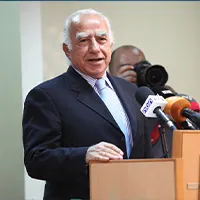
Political and National Positions: Tahseen Khayat Arrest
Tahseen Khayat was known for his courage, resilience, especially during the period of Syrian guardianship period over Lebanon. Al-Jadeed TV reflected this courage through its media positions opposing the policies of guardianship, corruption, submission, and surrender. One of his notable battles against corruption was the fight he and Al-Jadeed TV waged against blatant corruption in Bank Al-Madina, defending depositors and their funds.
Since 2002, Al-Jadeed TV took on the investigation of Bank Al-Madina. Khayat obtained documents proving the involvement of Syrian Brigadier General Rustum Ghazaleh and members of his family in withdrawing millions of dollars from the bank, leading to its collapse. This incident was the reason for Khayat’s arrest by the joint Lebanese-Syrian security system, and he was falsely accused of collaborating with Israel.
He was arrested on December 7, 2003, on false charges. However, his detention lasted no more than a day. Due to Khayat’s resilience in prison and his refusal to give way to all forms of threats, as well as the pressures from Lebanon and the Arab world, he was released. It should be noted that his file was empty, and the accusations filed against him were the product of imagination by those implicated in the Bank Al-Madina scandal. Khayat and Al-Jadeed continued their pursuit of justice in the Bank Al-Madina case, successfully recovering the rights of 14,000 depositors. It was a tremendously challenging battle.
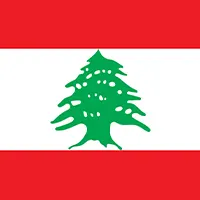
Threats and Assassination Attempts
Despite the professional setbacks in printing and publishing due to his political stances, Tahseen Khayat did not waver or falter in his fight against corruption and corrupt individuals. He faced multiple assassination attempts targeting his office, home, and Al-Jadeed TV. One notable incident involved 23 bullets fired at his office, an attempt to set his house ablaze with everyone inside, and repeated attacks on the television building.
Despite the gravity of these situations, each time he resorted to the judiciary and the state, refusing to engage or negotiate with any party responsible for the attacks. Although the investigative measures conducted by Al-Jadeed TV’s research unit identified the culprits, the judiciary and security agencies were unable to arrest them as they enjoyed support and protection from the ruling mafia.

The International Court and Al-Jadeed’s Battle
In 2014, Tahseen Khayat fought one of his fiercest battles, but this time under the umbrella of international law. The Special Tribunal for Lebanon accused Al-Jadeed TV and its Vice President, Karimah Khayat, of contempt of court for allegedly undermining the court, publishing the names of witnesses, and leaking confidential documents. It is worth noting that Al-Jadeed had exposed the corruption and scandalous practices of this court, including bribery, the use of false witnesses, and investigations conducted inappropriately, revealing the court’s misguided approach that fails to deliver justice.
Khayat, along with his daughter Karima, fought this battle in Lebanon and The Hague for two years, which ultimately resulted in the acquittal of Al-Jadeed and Karimah from the charges leveled against them. Karimah fearlessly confronted the court with strength and courage, gaining worldwide recognition, supported by the renowned British lawyer, Karim Khan, who was later appointed as the Chief Prosecutor of the International Criminal Court under the United Nations.
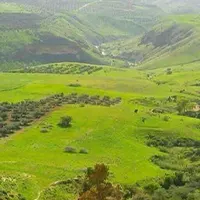
Individual Initiatives: The Issue of Shebaa Farms and Kfarshouba Hills
The Arab struggle of Tahseen Khayat took various approaches, through media work, political stances, and individual initiatives he undertook in Lebanon and the wider Arab world.
He embarked on several initiatives, notably the case of the missing Imam Musa Sadr, where he activated his mediation between Lebanon, Egypt, Iran, Libya, and Qatar. He utilized his relationships to uncover the truth, despite external factors and local obstacles in Lebanon that hindered the progress.
One of his recent initiatives revolves around the issue of Shebaa Farms and Kfarshouba Hills, which suffer under Israeli occupation. Through his Arab connections and friendships, Khayat attempted to raise awareness of the Shebaa Farms and Kfarshouba Hills issue. He conducted studies and gathered documents to prove the Lebanese ownership of these lands, aiming to urge the Arab and international communities to exert pressure on Israel to withdraw from Lebanon. Despite the difficulty of breaking the wall of silence, Khayat remained steadfast in his struggle.
